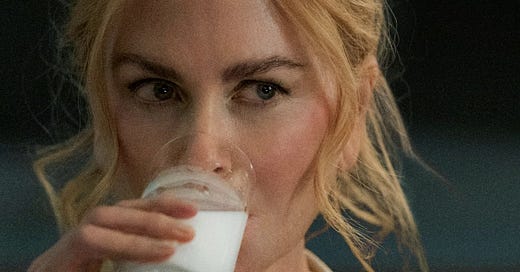‘Babygirl' Writer/director Halina Reijn has repeatedly said she made the film to help inspire conversations, so let’s talk.**
In particular, let’s talk about “shame” and how the movie plays with that concept in several different ways both intentionally, and perhaps unintentionally, given the current political/social landscape:
(1) The viewers’ shame. The movie depicts a woman (Nicole Kidman) having an orgasm at least twice. One of the most interesting things about this wasn’t actually seeing it on film, but rather more the internal reaction—discomfort—I experienced watching it in a public setting and, even more, hearing all the uncomfortable tiny murmurs and movements of those around me. There was a lot of shifting in chairs, little laughs, sucking in air, rustling with anything nearby to distract from what was happening on screen.
Amazing how we can watch movies where people are grotesquely slaughtered, with one man looking into another man’s eyes as he kills him, but a woman having an orgasm? For shame. The horror. Avert thine eyes.
For the record, ‘Babygirl’ is far from porn. In fact, I think it was almost too chaste in its depictions at times, but I’d bet Halina Reijn would say the point of the movie really isn’t about the sex itself—the point is how we still think of sex in such stark and shameful ways in our own lives and how we treat it as a society. Many of us think of ourselves as profoundly open-minded and evolved, but we still struggle to sit in a room with other people and have a silent conversation about sex, let alone having that conversation out loud.
We can talk about sex just fine out in public if it’s to make judgments about whether what someone did “right” or “wrong,” but we struggle to just watch and consider sex when depicted in a realistic way with people’s real wants and needs. People have no problem going through and diagnosing every fight scene in ‘John Wick’ or even women being violent like in ‘Killing Eve’ or ‘Yellowjackets’ or shows like that. But to just sit through a woman orgasming is still apparently too much for our “open-minded” society. In fact, a younger straight couple walked out of my theater during one such scene. (That is a whole other essay…)
Everyone who’s seen ‘Babygirl’ in the theater probably has a story about their audience. But even watching it at home, I think part of the interesting thing is what comes up inside of us as we watch these things, and how easy it is to shy away from them.
And I think it’s important that the movie asks us: Why? Why are we feeling embarrassed? Ashamed? It asks us to be curious about our own discomfort and the discomfort of those around us, and why we feel that way.
(2) Romy’s (Nicole Kidman) Shame, and How Feminism Shames Her. Romy has (at least) two shames.
The first shame is that she cares about sex, and getting pleasure from sex, especially at her age. It’s difficult to say when American society puts women out to pasture, but if the recent examples of artistic works featuring women dating younger men is any indicator, by the time a woman hits forty (and likely even before), many women feel like it’s pretty much assumed they’re done wanting to have exciting sex. See Miranda July’s ALL FOURS, Robinne Lee’s THE IDEA OF YOU and corresponding movie, and Julia May Jonas’ VLADIMIR. Women feel like they’ve been told, “see, you’re done,” “washed up,” or just “washed” period—“there’s no more life left for you in the sexual arena, just give it up.” And women are saying, “No, no way”—including Nicole Kidman’s character, Romy.
And it’s not just Romy’s age that makes her lust uncomfortable. It’s also her desire for more—her wanting. Romy “has it all”: the gorgeous husband, the two kids, the enviable job, plus the Manhattan condo and house in the country, not to mention access to a million expensive beauty treatments. And yet she wants more still. Women aren’t supposed to crave like this. They’re supposed to be content and still and peaceful—maternal and then grandmaternal. They’re supposed to find comfort in giving up all that vanity and neediness and leave it to the young. How dare an older woman for wanting more? For wanting sex. For wanting pleasure. For refusing to give up on herself and her lust for life.
I love that ‘Babygirl’ says, guess what: women don’t stop living once they’ve reached a certain point; they keep living and growing and changing and wanting. And why are we so threatened by that notion? Maybe it’s not for you, fine. But who are we to tell her what to feel?
The second shame is Romy’s illicit little kink: she wants to be dominated by a man. She spends all day being the one in control, the CEO of a major company, the decision-maker—yet in the bedroom, she wants the opposite. But that’s “shameful,” because as her female assistant reminds her, Romy is a woman who other women look up to, one of the few women who’s made it to the top. Women have fought so long, and so hard, for equality, for real power, that it’s obviously traitorous to her gender that Romy—this great, successful woman—wants to give away any of her power to a man. And it’s especially bad that she’d relinquish power just to pursue something society deems largely unimportant: a woman’s sexual pleasure, and an older woman’s sexual pleasure at that. Although it’s never said explicitly, it felt like Romy had been suppressing her own sexual desires for decades, perhaps because of the shame she harbors about herself and the feelings of betrayal to every other woman who doesn’t share her sexual proclivities.
Obviously (or at least to me, obviously) gender equality is paramount, but policing a woman’s sexuality seems like the opposite of that.
Telling women they aren’t supposed to feel this way or that way in 2025 feels like just more of the same regulation of their thoughts and minds and bodies just in a new perverted way.
Hell, Romy can’t even wear a cute apron she likes inside her own home without her husband, Jacob (Antonio Banderas), ridiculing her for looking silly, suggesting that a high-powered woman like her can’t wear an apron over her fine silk suit sets. Why not just let her wear the damn apron if that’s what she wants? Who exactly does that threaten?
I fear this all is effectively misguided feminism shaming Romy for her wants and needs. Take the famous milk scene. Samuel, the young guy, sends her a glass of milk, with the implicit “order” to drink it.
Women all around Romy tell her, “Don’t drink that,” “Don’t do it,” and I think Halina Reijn included the voices of those other women on purpose. Those other women don’t know who ordered the milk for Romy or why, but these women are nonetheless trying to tell Romy what to do, how to behave, how to act. And, yet, she drinks the milk anyway.
There’s something powerful at play beneath these scenes, like the one where Romy provides the advice that she “never shows any weakness,” and her assist corrects her and tells her that “vulnerability” and “emotional intelligence” is now en vogue. It’s clear from other moments in the film that Romy is nothing if not ruthless; she lives by her own words—show no weakness—and she made it to the top that way. But other women will tell her she’s wrong to think like that and certainly should never say it out loud anymore. I worry that this is more of feminism shaming her for how she’s lived thus far and how she intends to live in the future. And Romy doesn’t talk back—she accepts this new wisdom silently with no suggestion that there could be a greater conversation.
And maybe that’s what’s needed: a greater conversation. Because we can all pretend that everything is different, that women don’t have complicated wants and needs, that women can use really use only their “feminine EQ” to get to the top of a still-very patriarchal society with patriarchal rules, or we can be honest and have an honest conversation with all its nuances and painful realities and how it might actually be changed one day, not with shame but with exploration and discussion (and for the record, I think it should).
But ‘Babygirl’ suggests that maybe we should, at least, have the conversation about what’s real rather than just staying silent. And I think that’s important, because deluding ourselves about the world and how humans really act and feel doesn’t do anyone any favors.
(3) The men’s shame - Samuel (Harris Dickinson) and Jacob (Antonio Banderas). Although I’d love at least another hour of film time exploring how Samuel and Jacob view their roles in relation to Romy, I think the film does explore a bit about how shamed these men are in their own sexuality.
Yes, I really said that. Men, too, are struggling with how to be sexual creatures in this complicated, modern world.
Take early on, when Romy tries to voice what she wants to her husband. She puts a pillow over her head and says she wants him to have sex with her like that, while she watches porn. He starts to feel up her breasts, but then retreats, saying he feels like a “villain” touching her without her active participation and with the pillow over her head turning her into just a body. Something about this moment strikes me as so sad. I love that there are men out there who aren’t eager to grope a woman’s body without her participation, but she’s also telling him it’s okay, that this is what she wants. Shame, I fear, is what haunts Jacob. Villains do such things to women’s bodies. Good guys would never. But if we put things into such stark terms, so black and white, and don’t realize how complicated the human creature really is, that’s when people start to chafe against the rules.
Then, take Samuel. He wants to play the dom—and I use the word “play” intentionally; he seems to gather that what they’re doing isn’t really real. He’s not trying to dominate her when it comes to how she runs her company, he just wants to order her around in the bedroom, for her own pleasure as well as his. (Side note: I really did want to see more of what this looked like on screen, but probably American audiences couldn’t handle that without just calling the movie “porn,” which of course is “boo,” “hiss,” “bad.” Upsetting that we rarely get to see many realistic depictions of sex—anyway, this is a tangent.)
But most importantly to me is when in a tender moment post-coital in bed, Samuel asks Romy if he’s bad and admits he sometimes scares himself with his desires. Shame can, sometimes, be a useful emotion; it can help us figure out whether what we’re doing is what we really want to do. And here, Samuel is clearly grappling with whether his own sexual interests can be safely—and perhaps morally—explored.
Perhaps given the prevalence historically and currently of “bad men” in our society, it’s important for many good-hearted and well-intentioned men to make sure they are clearly in the “good men” bucket, and it strikes me as useful and important that men are thinking about who they want to be and thinking critically about how to explore their own desires in a way that’s safe and healthy. And yet, as with women, I worry if there’s too much emphasis into categorizing things and people into “good” and “bad” there’s going to be a reckoning—and not the kind we want.
Instead, more communication, more openness, more curiosity and less judgment, feels like much more the way to go. And isn’t art a lovely way to explore it all? I think so.
(4) What Art Owes the Present Moment//Shaming Art for the Acts of Hateful People. In discussing ‘Babygirl’ with friends and family, one thing I hear a lot is, “This is a dangerous movie to be out there right now, because there’s such backsliding in our society in this moment, with men saying, ‘Your body, my choice,’ when this movie is about a male dom and female sub and effectively saying the same thing.” I get that. I really do. We are living in such a f*cked-up time. And all of that “your body, my choice” stuff is absolutely not okay.
But what does that mean for art? Is the idea that ‘Babygirl’ should’ve been released only if Kamala got elected, or that it should’ve been locked away until better times, if they ever dare return? Or is the idea that this movie never should’ve been made or released, and it should have been suppressed it in the same way Romy suppressed her own sexuality for all those years?
To me, Halina Reijn and A24’s decision to release this movie now honestly feels like a rejoicing middle finger to all of those who would repress a woman’s sexuality and to anyone who would judge the messiness it took for Romy and Samuel to negotiate what they really want and how to relate to each other through all of it.
Halina Reijn has said in multiple forums that she views ‘Babygirl’ as a “comedy of manners,” which it absolutely is, and which is absolutely why audiences struggle with it. It’s difficult to watch two people navigate this treacherous path where a woman is giving up a bit of her power for pleasure and where a man is willing to take it. Halina Reijn does an amazing job showing them laughing and awkward and so discomfited by what they’re doing but also doing it anyway. Like how Samuel seeks clumsily to secure Romy’s consent and tries to explain the difference between the “playground” and reality, and attempts to implement things like safe words, while Romy—more divorced from her own reality and her feelings—struggles to believe she’s actually doing what she really wants, but again, doing it anyway, despite all the messiness.
And that’s the point, I think.
Because we all are living in this comedy of manners. For those of us who deeply believe in women’s equality and want it fiercely protected, it can be very difficult to discuss how this movie actually is okay. That we can actually say, yes, women are allowed to have their sexual wants and needs, while also saying 'f*ck you’ to the current powers that be and all their backwards, loony views on gender. That we can acknowledge that these two things aren’t mutually exclusive, and the braver thing is to recognize the nuances and have a more honest conversation.
To me, ‘Babygirl’ shows us that women aren’t traitors to their sex or gender by wanting what they want in bed. And while there may only be a slender slice of women who actually want this sort of sub/dom relationship, if the people in these relationships aren’t actually hurting anyone—and I don’t think they are if they aren’t trying to impose this on other people—then what’s the harm in those women exploring their desire? Isn’t it just the biggest middle finger of all to the people who would try to tell them how to behave in any context?
But yes, the argument is that men in particular will learn the wrong thing from this movie. Maybe. Humans have an uncanny ability to ruin everything, so I suppose it’s possible. But maybe not. Maybe men could pick up some other things. Like, when a woman tells you what she wants, listen, by curious, ask questions, and figure out where it feels safe for both of you. Because sometimes shame is useful, but other times, it’s not. Only careful, critical thinking will help us figuring out our values and our judgments. And perhaps a movie, a piece of art, can help us start to think about these things in a safe context, before we actually test these things in real life.
Because isn’t this is the point of art? To get us thinking, and processing, and exploring what it means to be human, living in this imperfect world, and how we can take the most from it, and give back as well. That’s what ‘Babygirl’ brilliantly achieves: provoking discussions, and ones well-worth having, even against the insane backdrop of our current world.
** Disclaimers: (1) I loved the movie, it’s not perfect, but it’s very good, and I saw it twice, by myself, so I could really scrutinize it; (2) freakishly, my book LOST CAUSE—not yet published—is very similar but includes the younger guy’s point of view, so I have a vested interest in this discussion; (3) I’ve listened to several of Halina Reijn’s interviews on podcasts, etc.






Well, certainly for “older women” in their 50s, but even more so for myself in my mid 70s. Still not an older woman. That might come in my 90s. All this still rings true. Desire is not diminished.
This was an outstanding contextualization. I saw the movie, and my thinking about it is helped by your piece. I am writing a book where my super-conventional fifty-something character has to lose her preconceptions about sex at her age and you've helped me organize my thinking.